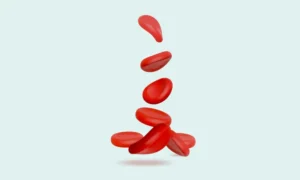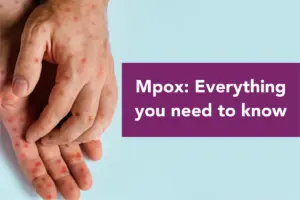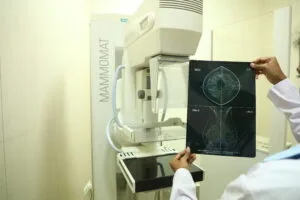Drug-Induced Thrombocytopenia: Causes and Treatment

A 75-year-old female patient was admitted with breathlessness and chest pain. She was diagnosed with an anterior wall myocardial infarction (AWMI). She was admitted and was given clopidogrel and tirofiban.
At the time of admission, her CBC parameters were normal. But within 24 hours, her platelets had dropped drastically (see table below).
| Day 1 (Morning) | Day 2 (Morning) | Day 2 (Evening) | |
| Hemoglobin (g/dL) | 11.3 | 11.2 | 11.1 |
| Total WBC Count (/cu.mm) | 19,220 | 11,410 | 9,520 |
| Platelet Count (/cu.mm) | 3,90,000 | 15,000 | 8,000 |
| Mean Platelet Volume (fL) | 9.7 | 10.0 | 10.0 |
| Platelet Distribution Width (%) | 15.1 | 16.4 | 10.6 |
| Immature Platelet Fraction (%) | – | 57.60 | – |
After further investigation, the cause of the thrombocytopenia was determined to be tirofiban. After substituting the drug, the platelet count came back to normal.
TIROFIBAN INDUCED SEVERE THROMBOCYTOPENIA
Glycoprotein IIb/IIIa receptor antagonists (GPRAs), such as ABCIXIMAB, EPTIFIBATIDE, and TIROFIBAN, inhibit platelet aggregation by preventing the binding of fibrinogen to platelets.(1)
These drugs are used worldwide in patients with acute coronary syndrome or those undergoing percutaneous coronary intervention (PCI).(1)
However, glycoprotein IIb/IIIa inhibitors are reported to be associated with thrombocytopenia. (1,2)
Five patterns of GPRA-induced thrombocytopenia have been identified(3):
- Acute severe thrombocytopenia (<10,000 /cu.mm) within 12 hours of first exposure
- Acute thrombocytopenia within 12 hours of second exposure
- Delayed thrombocytopenia (5-7 days after treatment)
- Anaphylaxis after first or second exposure
- Pseudo-thrombocytopenia due to platelet clumping
GPRAs cause drug-induced immune thrombocytopenia secondary to the development of circulating antibodies against IIb/IIIa antagonists, which occurs in patients who have previously been exposed to the drug or due to naturally occurring antibodies.(3,4)
Delayed onset of thrombocytopenia is explained by the persistence of platelet-bound drug for several weeks after treatment, rendering platelets susceptible to destruction by the newly formed antibodies.(3,4)
In clinical trials of tirofiban, the incidence of severe thrombocytopenia (<50,000 /cu.mm) ranged from 0.1% to 0.5%, and the incidence of profound thrombocytopenia (<20,000 /cu.mm) is very rare.(1)
TAKE HOME MESSAGE
- Tirofiban-induced thrombocytopenia seemed to be easily resolved by the interruption of antiplatelet drugs and early supportive treatment.
- The early discovery of tirofiban-induced acute profound thrombocytopenia is very important.
REFERENCES:
- Liu Y-Y, Dong Q-T, Guo Y-L, Wu N-Q, Li J-J. Tirofiban-Induced Severe Thrombocytopenia. Am J Ther. 2019 Sep;26(5):e659–61.
- Panduranga P, Sulaiman K. Severe thrombocytopenia following tirofiban infusion. Indian J Pharmacol. 2011 Nov;43(6):726–8.
- Aster RH, Curtis BR, Bougie DW, Dunkley S, Greinacher A, Warkentin TE, et al. Thrombocytopenia associated with the use of GPIIb/IIIa inhibitors: position paper of the ISTH working group on thrombocytopenia and GPIIb/IIIa inhibitors. J Thromb Haemost. 2006 Mar;4(3):678–9.
- Aster RH. Immune thrombocytopenia caused by glycoprotein IIb/IIIa inhibitors. Chest. 2005 Feb;127(2 Suppl):53S-59S.



